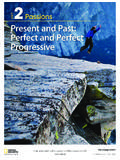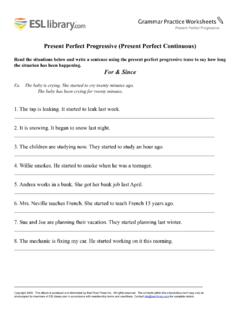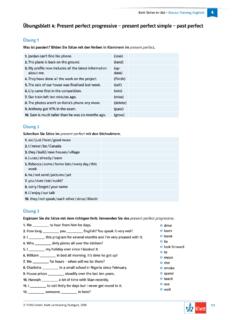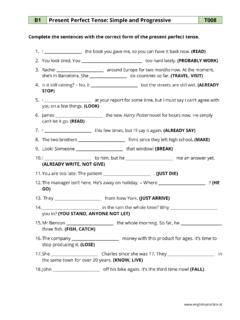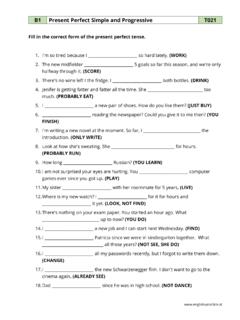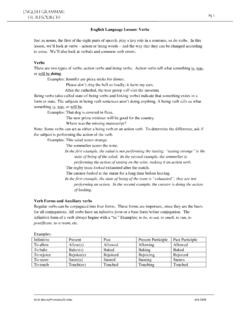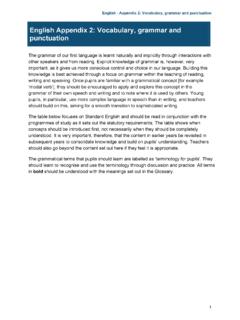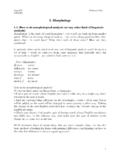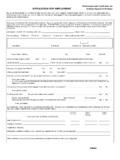Transcription of Glossary for the programmes of study for English (non ...
1 English Glossary Glossary for the programmes of study for English (non-statutory). The following Glossary includes all the technical grammatical terms used in the programmes of study for English , as well as others that might be useful. It is intended as an aid for teachers, not as the body of knowledge that should be learnt by pupils. Apart from a few which are used only in schools (for example, root word), the terms below are used with the meanings defined here in most modern books on English grammar. It is recognised that there are different schools of thought on grammar, but the terms defined here clarify those being used in the programmes of study . For further details, teachers should consult the many books that are available.
2 Terms in definitions As in any tightly structured area of knowledge, grammar, vocabulary and spelling involve a network of technical concepts that help to define each other. Consequently, the definition of one concept builds on other concepts that are equally technical. Concepts that are defined elsewhere in the Glossary are hyperlinked. For some concepts, the technical definition may be slightly different from the meaning that some teachers may have learnt at school or may have been using with their own pupils; in these cases, the more familiar meaning is also discussed. Term Guidance Example active voice An active verb has its usual pattern Active: The school arranged a visit. of subject and object (in contrast with Passive: A visit was arranged by the passive).
3 The school. adjective The surest way to identify adjectives The pupils did some really good is by the ways they can be used: work. [adjective used before a before a noun, to make the noun, to modify it]. noun's meaning more specific Their work was good. [adjective ( to modify the noun), or used after the verb be, as its after the verb be, as its complement]. complement. Not adjectives: Adjectives cannot be modified by The lamp glowed. [verb]. other adjectives. This distinguishes It was such a bright red! [noun]. them from nouns, which can be. He spoke loudly. [adverb]. Adjectives are sometimes called It was a French grammar book. describing words' because they pick [noun]. out single characteristics such as size or colour.
4 This is often true, but it doesn't help to distinguish adjectives from other word classes, 1. English Glossary Term Guidance Example because verbs, nouns and adverbs can do the same thing. adverb The surest way to identify adverbs is Usha soon started snoring loudly. by the ways they can be used: they [adverbs modifying the verbs can modify a verb, an adjective, started and snoring]. another adverb or even a whole That match was really exciting! clause. [adverb modifying the adjective Adverbs are sometimes said to exciting]. describe manner or time. This is We don't get to play games very often true, but it doesn't help to often. [adverb modifying the other distinguish adverbs from other word adverb, often]. classes that can be used as adverbials, such as preposition Fortunately, it didn't rain.
5 [adverb phrases, noun phrases and modifying the whole clause it didn't subordinate clauses. rain' by commenting on it]. Not adverbs: Usha went up the stairs. [preposition phrase used as adverbial]. She finished her work this evening. [noun phrase used as adverbial]. She finished when the teacher got cross. [subordinate clause used as adverbial]. adverbial An adverbial is a word or phrase that The bus leaves in five minutes. is used, like an adverb, to modify a [preposition phrase as adverbial: verb or clause. Of course, adverbs modifies leaves]. can be used as adverbials, but many She promised to see him last night. other types of words and phrases [noun phrase modifying either can be used this way, including promised or see, according to the preposition phrases and subordinate intended meaning].
6 Clauses. She worked until she had finished. [subordinate clause as adverbial]. antonym Two words are antonyms if their hot cold meanings are opposites. light dark light heavy apostrophe Apostrophes have two completely I'm going out and I won't be long. different uses: [showing missing letters]. showing the place of missing Hannah's mother went to town in letters ( I'm for I am) Justin's car. [marking possessives]. 2. English Glossary Term Guidance Example marking possessives ( Hannah's mother). article The articles the (definite) and a or an The dog found a bone in an old (indefinite) are the most common box. type of determiner. auxiliary verb The auxiliary verbs are: be, have, do They are winning the match. [be and the modal verbs.]
7 They can be used in the progressive ]. used to make questions and Have you finished your picture? negative statements. In addition: [have used to make a question, be is used in the progressive and and the perfect ]. passive No, I don't know him. [do used to have is used in the perfect make a negative; no other auxiliary do is used to form questions and is present]. negative statements if no other Will you come with me or not? auxiliary verb is present [modal verb will used to make a question about the other person's willingness]. clause A clause is a special type of phrase It was raining. [single-clause whose head is a verb. Clauses can sentence]. sometimes be complete sentences. It was raining but we were indoors. Clauses may be main or [two finite clauses].
8 Subordinate. If you are coming to the party, Traditionally, a clause had to have a please let us know. [finite finite verb, but most modern subordinate clause inside a finite grammarians also recognise non- main clause]. finite clauses. Usha went upstairs to play on her computer. [non-finite clause]. cohesion A text has cohesion if it is clear how A visit has been arranged for Year the meanings of its parts fit together. 6, to the Mountain Peaks Field Cohesive devices can help to do study Centre, leaving school at this. This is an overnight visit. The centre has beautiful In the example, there are repeated grounds and a nature trail. During references to the same thing (shown the afternoon, the children will by the different style pairings), and follow the trail.
9 The logical relations, such as time and cause, between different parts are clear. cohesive device Cohesive devices are words used to Julia's dad bought her a football. show how the different parts of a text The football was expensive! fit together. In other words, they [determiner; refers us back to a create cohesion. particular football]. 3. English Glossary Term Guidance Example Some examples of cohesive devices Joe was given a bike for are: Christmas. He liked it very much. determiners and pronouns, which [the pronouns refer back to Joe can refer back to earlier words and the bike]. conjunctions and adverbs, which We'll be going shopping before we can make relations between go to the park. [conjunction; makes words clear a relationship of time clear].
10 Ellipsis of expected words. I'm afraid we're going to have to wait for the next train. Meanwhile, we could have a cup of tea. [adverb; refers back to the time of waiting]. Where are you going? [ ] To school! [ellipsis of the expected words I'm going; links the answer back to the question]. complement A verb's subject complement adds She is our teacher. [adds more more information about its subject, information about the subject, she]. and its object complement does the They seem very competent. [adds same for its object. more information about the subject, Unlike the verb's object, its they]. complement may be an adjective. Learning makes me happy. [adds The verb be normally has a more information about the object, complement.]










